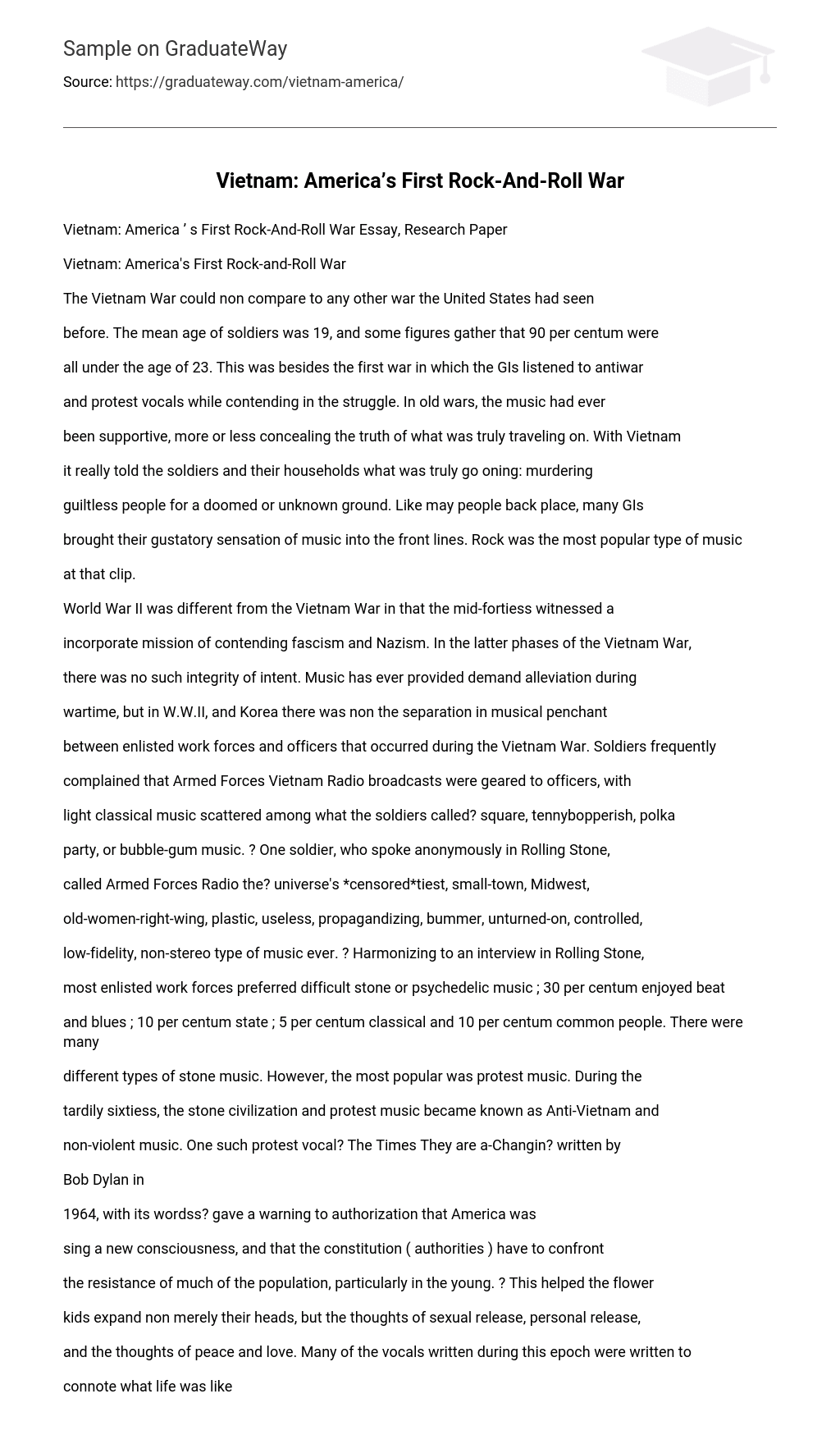The Vietnam War could non compare to any other war the United States had seen before. The mean age of soldiers was 19, and some figures gather that 90 per centum were all under the age of 23. This was besides the first war in which the GIs listened to antiwar and protest vocals while contending in the struggle.
In old wars, the music had ever been supportive, more or less concealing the truth of what was truly traveling on. With Vietnam it really told the soldiers and their households what was truly go oning: murdering guiltless people for a doomed or unknown ground. Like may people back place, many GIs brought their gustatory sensation of music into the front lines. Rock was the most popular type of music at that clip.
World War II was different from the Vietnam War in that the mid-fortiess witnessed a incorporate mission of contending fascism and Nazism. In the latter phases of the Vietnam War, there was no such integrity of intent. Music has ever provided demand alleviation during wartime, but in W.W.II, and Korea there was non the separation in musical penchant between enlisted work forces and officers that occurred during the Vietnam War.
Soldiers frequently complained that Armed Forces Vietnam Radio broadcasts were geared to officers, with light classical music scattered among what the soldiers called square, tennybopperish, polka party, or bubble-gum music. One soldier, who spoke anonymously in Rolling Stone, called Armed Forces Radio the universe’s *censored*tiest, small-town, Midwest, old-women-right-wing, plastic, useless, propagandizing, bummer, unturned-on, controlled, low-fidelity, non-stereo type of music ever.
Harmonizing to an interview in Rolling Stone, most enlisted work forces preferred difficult stone or psychedelic music ; 30 per centum enjoyed beat and blues ; 10 per centum state ; 5 per centum classical and 10 per centum common people. There were many different types of stone music. However, the most popular was protest music.
This helped the flower kids expand non merely their heads, but the thoughts of sexual release, personal release, and the thoughts of peace and love. Many of the vocals written during this epoch were written to connote what life was like in Vietnam. Such vocals as Purple Haze by Jimi Hendrix had the allusion of the violet fume left on the landing zones. In another vocal, Charming Mystery Tour by The Beatles, the lines? coming to take you off, deceasing to take you off, held particular significance for those Marines at the Khe Sanh, because the authorities forced them to travel to war, and they were literally deceasing to be taken off. Many Asiatic sets tried to copy British and American stone groups and execute such vocals as San Francisco ( Be Certain to Wear Some Flowers in Your Hair ) , Hey Jude, Simon Says, Gloria, and Black Is Black.
These hapless diversions gave the soldiers a gleam of place and hope. These types of vocals protested against the inexperienced person slaughter of American work forces, every bit good as Vietnamese work forces who were forced to contend against one another. The decennary of the 1960ss brought with it the thought of drugs, sex and rock ‘n’ roll – which was what was truly traveling on non merely at place, but on the battleground.
The black market and harlotry allowed the soldiers some freedom to acquire off from the violent death. The music of Vietnam was nil like anything of all time seen earlier. What was really go oning out on the field was what the instrumentalists were really singing about. But did music truly lend to the stoping of the war? Did the constructs of free love and peace aid? Whether the music really changed heads or non, there is no uncertainty that it helped those that were involved in it feel like they really did something worthwhile. They were non merely sitting place pretense that perfectly nil was go oning ; they were contending their ain conflict: a conflict against the constitution and those who erroneously claimed to cognize what was right and what was incorrect.





